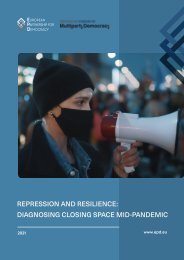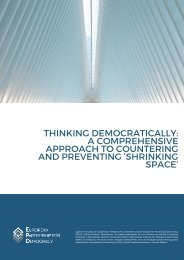Political Party Guidelines Eng
You also want an ePaper? Increase the reach of your titles
YUMPU automatically turns print PDFs into web optimized ePapers that Google loves.
Annex:
CEDAW
Myanmar is party to UN conventions, which legally bind it to certain international standards as comes
to human rights. The Convention on the Elimination of All Forms of Discrimination against Women,
also known as CEDAW, is an international bill of rights for women. The United Nations General Assembly
adopted the Convention in December 1979. Consisting of a preamble and 30 articles, CEDAW
defines what constitutes discrimination against women and sets up an agenda for national action to
foster greater equality. CEDAW is often referred to as the Women’s Convention because, unlike conference
declarations, it sets legally-binding principles and standards for fulfilling women’s rights.
Since 1982 the CEDAW committee has been meeting on a regular basis to go through reports submitted
usually every fourth year by the nations who are members of the treaty, evaluating how the member
states are advancing in fulfilling the obligations of the treaty. Usually NGOs leave at the same time to
the CEDAW committee a so called shadow report, which gives the committee the possibility to evaluate
the situation of a given country from a wider perspective.
Myanmar reported last to the committee in 2016. At the same time, seven civil society organisations
(CSO) submitted shadow reports to the UN CEDAW Committee. There is a regular coordination
mechanism among the government and CSOs that submitted shadow reports to respond to the concluding
observation from UN CEDAW Committee 2016.
The concluding observations can be found at:
http://www.burmalibrary.org/docs22/Myanmar-CEDAW64-Concluding_Observations-red.pdf
UNSCR 1325
In 2000, United Nations Security Council (UNSC) adopted resolution 1325 on Women, Peace and Security.
It has been followed by seven other resolutions (UNSCR 1820, 1888, 1889, 1960, 2106, 2122 and
2242), which make up the Women, Peace and Security Agenda. The objective is to give women a voice
in conflicts, to stop gender based violence of wars and conflicts, to bring women to the negotiation
tables, to create inclusive and more democratic peace-making processes and to write more equitable
peace deals.
Many countries have written National Action Plans (NAP) on the Women, Peace and Security agenda.
Till now, Myanmar has not. But, whether there is a NAP or not, member countries of UN should follow
the 1325 and sister resolutions.
SDG 5
UN Sustainable Development Goals (SDGs) were mentioned earlier on (see Chapters 1.2 and 3.1).
Each of the 17 goals has specific targets on how to reach the goals and, to monitor the success of reaching
the target, an indicator or indicators.
Goal 5 – Achieve gender equality and empower all women and girls – has:
GENDER EQUALITY: A SHORTCUT TO DEVELOPMENT AND PROSPERITY 35


















